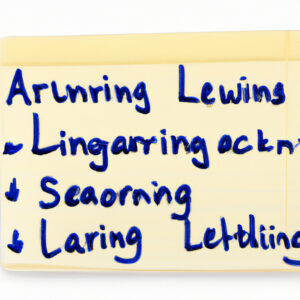Is Algorithm Easy to Learn? A Step-by-Step Guide for Beginners
You’ve probably heard about algorithms before and wondered, is algorithm easy to learn? Well, today we’re going to dive into this fascinating world and uncover the truth behind learning algorithms. We’ll explore what an algorithm is, how it works, and whether it’s truly easy for beginners to grasp. So sit back, relax, and let’s get started!
What is an Algorithm?
An algorithm is simply a set of instructions or rules that are followed to solve a problem or complete a task. Think of it like a recipe; you follow step by step to make a delicious dish. Similarly, an algorithm offers a series of steps to arrive at a solution for a specific problem.
Algorithms are commonly used in computer programming, where they help computers perform complex tasks more efficiently. But they’re not limited to just computers – algorithms can be found in everyday life, like solving a math problem, arranging files alphabetically, or even organizing a closet.
The Key Elements of an Algorithm
Before we answer the big question – is algorithm easy to learn – let’s first take a look at the key elements of an algorithm:
- Preciseness: An algorithm must be clearly defined and unambiguous, with each step specified in detail.
- Input: An algorithm usually requires some input data to process and generate results.
- Output: After processing the input data, an algorithm delivers the desired output or results.
- Finiteness: An algorithm must have a finite number of steps, ensuring that it eventually comes to an end.
- Effectiveness: An algorithm must be able to perform its tasks efficiently using basic operations.
Is Algorithm Easy to Learn? The Learning Curve
Now, let’s address the question you’ve been waiting for – is algorithm easy to learn? The answer is both yes and no. It largely depends on your background, interest, and dedication. Let’s break this down:
- Your Background: If you have a strong foundation in mathematics, programming, or problem-solving, learning algorithms will be easier for you. However, even without this background, you can still learn algorithms with the right approach and mindset.
- Your Interest: How interested are you in learning algorithms? Your interest and passion play a significant role in determining how quickly and easily you grasp new concepts.
- Your Dedication: Learning algorithms requires time and dedication. If you’re committed to putting in the necessary effort, you’ll find it easier to learn and master algorithms.
Breaking Down Algorithm Learning into Manageable Steps
To make learning algorithms more accessible, we recommend breaking the process down into manageable steps. This can help you tackle each concept systematically while building on your knowledge incrementally. Here’s a suggested approach:
- Learn the basics: Start by understanding the fundamental concepts of algorithms, such as input, output, and flow control.
- Study examples: Analyze simple, real-life examples of algorithms and try to understand how they work.
- Practice problem-solving: Apply what you’ve learned by solving problems using algorithms, starting with basic tasks and gradually progressing to more complex challenges.
- Learn programming languages: As you gain confidence, explore different programming languages and learn how to implement algorithms using code.
- Keep learning and improving: Continuously seek out new resources and challenges to further develop your algorithm skills.
Conclusion: Are Algorithms Easy to Learn?
In conclusion, while the answer to the question, “is algorithm easy to learn?” may depend on your individual background, interest, and dedication, it’s definitely possible for beginners to grasp algorithms with the right approach. By breaking down your learning journey into manageable steps and building upon your knowledge incrementally, you can conquer the fascinating world of algorithms!
So, what are you waiting for? Dive into the realm of algorithms and unlock new possibilities for problem-solving and critical thinking. Remember, the key is to stay curious, committed, and persistent in your learning journey.
How I Would Learn to Code in 2023 (if I had to start over)
DELETE Your Old RSI, and Try This New RSI Instead [It Will Blow Your Mind!]
What is the duration required to become proficient in algorithms?
The duration required to become proficient in algorithms varies from person to person, depending on factors such as background, prior experience, and dedication to learning. On average, it might take anywhere from 3 months to 2 years to become proficient in algorithms.
For those with a strong background in computer science or mathematics, the process might be quicker. However, for beginners with little to no programming experience, it will take longer to grasp the concepts.
To speed up the process and ensure proficiency, consider the following recommendations:
1. Study consistently: Set aside regular time for learning algorithms, such as a few hours each day or week.
2. Learn from various resources: Use different sources like textbooks, online courses, blogs, and video lectures to build a comprehensive understanding of algorithms.
3. Practice with coding challenges: Apply the acquired knowledge by solving algorithmic problems on platforms like LeetCode, HackerRank, or Codeforces.
4. Understand Time and Space complexity: Analyze the efficiency of your code to improve your understanding of how algorithms perform under different circumstances.
5. Review: Regularly review previously covered materials to reinforce learning and identify areas that need further improvement.
Remember, becoming proficient in algorithms is a continuous learning process; the more practice and exposure you have, the better you will become.
Is learning algorithms a challenging process?
Learning algorithms can be a challenging process for some individuals, especially those who are new to programming and computer science. The complexity of algorithms can vary greatly, ranging from simple sorting algorithms to advanced data structures and graph theory.
One of the main reasons learning algorithms can be challenging is that it requires a solid understanding of mathematics, logic, and problem-solving skills. Additionally, some algorithms may require knowledge of specific programming languages or paradigms, further increasing the learning curve.
However, with determination, patience, and practice, one can develop a strong foundation in algorithms and improve their problem-solving abilities significantly. It is essential to start with the basics, gradually progressing to more complex algorithms, while consistently practicing through coding exercises and real-world applications of these algorithms. Ultimately, the challenge of learning algorithms can be overcome, and the benefits gained in terms of programming skills and career opportunities make it a worthwhile pursuit.
Can algorithms be easily comprehended?
Algorithms can be easily comprehended depending on the individual’s background knowledge and experience in computer science or programming. For someone with a strong foundation in these areas, algorithms can be relatively easy to understand. However, for beginners or people from non-technical backgrounds, comprehending algorithms may pose a challenge.
The key to understanding algorithms is breaking them down into smaller components and focusing on the logic behind each step. With practice and exposure to different types of algorithms, one can gradually develop their skills to comprehend and implement algorithms more effectively.
Is it possible to teach myself algorithms?
Yes, it is definitely possible to teach yourself algorithms. In the context of algorithms, self-study can be an effective and rewarding way to gain a deep understanding of the subject.
First, you need to have a strong foundation in mathematics, particularly in areas like discrete mathematics, probability, and basic calculus. These subjects are essential for understanding the underlying principles of algorithms.
Next, you’ll need a good understanding of programming and data structures. Familiarize yourself with a popular programming language (such as Python, Java, or C++) and learn about common data structures like arrays, linked lists, and trees, as they are often used in algorithm implementation.
To learn algorithms, you can follow these steps:
1. Start with basic algorithms: Focus on learning fundamental algorithms like sorting (e.g., quicksort, merge sort) and searching (e.g., binary search). Get comfortable with their implementation and analyzing their time complexity.
2. Get a good reference book: There are several excellent books available for learning algorithms, such as “Introduction to Algorithms” by Cormen, Leiserson, Rivest, and Stein or “The Art of Computer Programming” by Donald Knuth. These books cover a wide variety of algorithms and provide detailed explanations, examples, and exercises.
3. Take online courses: There are many online courses and tutorials available that can help you learn algorithms at your own pace. Websites like Coursera, edX, and Udacity offer courses on algorithms from top universities like Stanford, MIT, and Princeton.
4. Practice: Like any skill, mastering algorithms requires practice. Try to implement algorithms you’ve learned and solve various problems using them. Websites like LeetCode, HackerRank, and Codeforces offer numerous problems for practicing algorithms in different difficulty levels.
5. Learn from others & join online communities: Engage with other learners and experts in the field through forums like Stack Overflow or subreddits like r/algorithms. This will allow you to learn from others’ experiences, ask questions, and share your knowledge.
Remember, learning algorithms is an ongoing process, so stay committed and keep practicing to develop your skills further.
What are the most effective strategies for learning algorithms easily and efficiently?
Learning algorithms easily and efficiently requires a combination of understanding the underlying concepts, practicing problem-solving, and applying the learned techniques in real-world scenarios. Here are some effective strategies to learn algorithms:
1. Understand the Basics: Start by learning the basic concepts and terminology used in algorithms, such as time complexity, space complexity, and algorithm types (e.g., divide and conquer, dynamic programming, etc.).
2. Study Algorithm Examples: Familiarize yourself with well-known algorithms such as sorting (e.g., bubble sort, quick sort), searching (e.g., binary search), graph algorithms (e.g., shortest path), and more. Study their implementation, understand the logic, and analyze their time and space complexities.
3. Practice Problem Solving: Practice solving algorithmic problems on platforms like LeetCode, HackerRank, and CodeSignal regularly. This helps you develop a strong intuition for identifying and applying appropriate algorithms to given problems.
4. Break Down Complex Problems: When faced with a challenging problem, break it down into smaller, more manageable sub-problems. This allows you to understand the overall structure and makes it easier to apply relevant algorithms.
5. Learn Multiple Approaches: Understand that there can be multiple ways to solve the same problem using different algorithms. Analyze the pros and cons of each approach and choose the best fit for your use case.
6. Collaborate with Others: Engage with online programming communities or join local meetups to discuss problems, share solutions, and learn from fellow programmers. Collaboration exposes you to new ideas and helps you learn faster.
7. Apply Algorithms in Real-World Projects: Implement the algorithms you have learned in practical projects or contribute to open-source repositories. This helps in solidifying your understanding of algorithms and their applications.
8. Continuous Learning and Improvement: Keep learning and improving your algorithm knowledge by staying up-to-date with the latest advancements, research papers, and online courses.
Remember, practice is key when it comes to learning algorithms. The more you practice and apply what you’ve learned, the better you become at solving algorithm problems and implementing them in real-world scenarios.
How can beginners break down complex algorithms to learn them more quickly?
Breaking down complex algorithms can be a daunting task for beginners, but with a systematic approach, it becomes more manageable. Here are some tips to break down and learn complex algorithms more quickly:
1. Understand the problem: Read and understand the problem statement thoroughly. Be aware of the input, output, and any constraints or edge cases.
2. Break into smaller parts: Divide the algorithm into smaller components, focusing on individual steps or sub-problems that together form the overall solution.
3. Analyze examples: Work through examples to see how the algorithm processes different inputs and understand the expected outputs.
4. Visualize the process: Create visual representations such as flowcharts, diagrams, or pseudocode to illustrate the algorithm’s flow and steps.
5. Learn the terminology: Familiarize yourself with technical terms and notations used in the algorithm to avoid confusion when learning and discussing with others.
6. Use available resources: Utilize online tutorials, videos, articles, and books for additional explanations, examples, and demonstrations.
7. Implement the algorithm: Write code to implement the algorithm, which solidifies your understanding and helps you identify any gaps in your knowledge.
8. Test your implementation: Perform extensive testing using different inputs, edge cases, and performance benchmarks to validate your implementation.
9. Optimize your solution: Look for ways to improve your code, considering time and space complexity, readability, and maintainability.
10. Teach someone else: Explaining the algorithm to someone else can help solidify your understanding and reveal areas that need further clarification.
By breaking down complex algorithms into smaller, manageable parts and using these strategies, beginners can more effectively learn and apply new algorithms in their studies and projects.
Which algorithms provide the best foundation for easy understanding and further learning in the field?
The best algorithms to provide a solid foundation for easy understanding and further learning in the field of algorithms are:
1. Sorting Algorithms: These are essential for organizing and processing data effectively. Some of the most popular sorting algorithms include Bubble Sort, Selection Sort, Insertion Sort, Merge Sort, and Quick Sort.
2. Searching Algorithms: They are crucial for finding specific elements or values within a data set. The most widely-used searching algorithms are Linear Search and Binary Search.
3. Graph Algorithms: Graphs are an important data structure, and graph algorithms help analyze connections and relationships within these structures. Key graph algorithms include Depth-First Search (DFS), Breadth-First Search (BFS), Dijkstra’s Algorithm, and Prim’s Algorithm.
4. Dynamic Programming Algorithms: These algorithms optimize solutions by breaking problems into smaller overlapping subproblems. Some well-known dynamic programming algorithms are Knapsack Problem, Longest Common Subsequence, and Fibonacci Series.
5. Divide and Conquer Algorithms: These algorithms solve complex problems by dividing them into more manageable subproblems. The earlier mentioned algorithms like Merge Sort, Quick Sort, and Dijkstra’s Algorithm are good examples of divide and conquer strategies.
6. Greedy Algorithms: Greedy algorithms make the best local choice at each step with the hope of finding the optimal solution. Some popular greedy algorithms are Kruskal’s Algorithm, Huffman Coding, and Travelling Salesman Problem.
Mastering these fundamental algorithms will not only help in easy understanding of the field but also pave the way for learning more advanced algorithms and techniques in the future.




